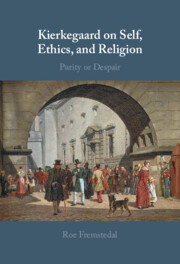Book contents
- Kierkegaard on Self, Ethics, and Religion
- Kierkegaard on Self, Ethics, and Religion
- Copyright page
- Dedication
- Contents
- Figures and Tables
- Acknowledgments
- Abbreviations
- Introduction
- Part I Self, Despair, and Wholeheartedness
- Chapter 1 Selfhood and Anthropology
- Chapter 2 Why Be Moral? The Critique of Amoralism
- Chapter 3 Moral Inescapability: Moral Agency and Metaethics
- Part II Morality, Prudence, and Religion
- Part III “Subjectivity, Inwardness, Is Truth”
- Part IV Faith and Reason
- References
- Index
Chapter 2 - Why Be Moral? The Critique of Amoralism
from Part I - Self, Despair, and Wholeheartedness
Published online by Cambridge University Press: 27 January 2022
- Kierkegaard on Self, Ethics, and Religion
- Kierkegaard on Self, Ethics, and Religion
- Copyright page
- Dedication
- Contents
- Figures and Tables
- Acknowledgments
- Abbreviations
- Introduction
- Part I Self, Despair, and Wholeheartedness
- Chapter 1 Selfhood and Anthropology
- Chapter 2 Why Be Moral? The Critique of Amoralism
- Chapter 3 Moral Inescapability: Moral Agency and Metaethics
- Part II Morality, Prudence, and Religion
- Part III “Subjectivity, Inwardness, Is Truth”
- Part IV Faith and Reason
- References
- Index
Summary
Chapter 2 deals with the critique of the aesthetical stage by focusing on Either/Or. It is shown that this critique offers an original answer to the “why be moral?” question relevant to contemporary debates on amoralism and practical moral skepticism. Specifically, Either/Or develops an original critique of amoralism that escapes a difficult dilemma associated with justifications of morality. According to this dilemma, any such justification must either offer moral or nonmoral (prudential) reasons for being moral. But the former seems circular and question begging, whereas the latter seems like the wrong kind of reasons, which could only support egoism and legality, not altruism and morality. However, Kierkegaard develops three different argumentative strategies that all escape this dilemma, providing strong motivation and reasons for assessing ourselves morally. He thus offers a powerful critique of amoralism that is relevant to contemporary concerns, while being rooted in historical discussions of Kantianism, German Romanticism, and idealism.
- Type
- Chapter
- Information
- Kierkegaard on Self, Ethics, and ReligionPurity or Despair, pp. 34 - 53Publisher: Cambridge University PressPrint publication year: 2022

